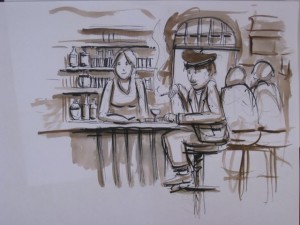As Legend has it by Ira Maine
Legend has it,when Francis Drake, on the rain puddled road, saw Queen Elizabeth approach, he gallantly swept off his cloak and placed it over a big puddle. Liz stepped daintily dry on the proffered garment, and was, as a consequence, not only dry, but forever in the pirate’s debt. This is the romantic legend and is, not to put too fine a point on it, exquisite codswallop.
Try putting a coat over a puddle, and then stepping on it. The result is invariably a boot full of freezing water and permanently wet socks. This is why, and don’t look because it’s not recorded in the Annals, this is why Queen Elizabeth boxed Drake’s ears and had him executed.
No, the reality was that, if the cloak was to succeed, then it needed something substantial underneath it to keep the Royal size elevens out of the water. What on earth was to be done? Courtiers could hardly be expected to carry a finely wrought wooden platform wherever they went, on the off chance that they might meet up with Her Madge. And even if they did, what if the sun was splitting the trees and there wasn’t a puddle for miles? What to do then? Carry a bucket of water?
An Elizabethan scullion, of whom more shall be heard later, came up with the answer; it became hugely fashionable, overnight for courtiers to have a small dog, fluffed and flounced and bedecked with ribbons, whose sole function was to prevent the Royal Personage’s toes from encountering the distasteful effluent of the streets.
The scullion, seeing an opportunity, and prescient as all get out, began to breed and train a bigger dog, a dog trained to kneel and provide a low platform for a lady’s foot as she made to mount her pony.As the training increased, the dog was taught to rise, taking the lady’s weight and hoisting her elegantly into the saddle. It was a simple matter then, especially in the cold of Winter, to hire the dog out as a foot warmer for the journey.
Well, once off the ground, there was no stopping this movement. Due to the new agricultural developments, horses got bigger causing the scullion and his sons to breed bigger and stronger dogs. These bigger dogs were wildly successful, particularly amongst the men, although there was one less than elegant result of the heavier weight; as the dogs got bigger, their kneeling knees began to lose their coats. Pink, balding knees were held up for ridicule by the fashionable, until the scullion’s heirs fitted knee pads.
When Ebeneezer Skinner in the 18th century, invented the mounting block, the writing was on the wall for the scullion dog.
Quietly, Bontemps Tuileries, the now owner of the breed and a broken man, accepted an offer from a German breeder and shipped, secretly and illegally, what remained of the breed off by train to the famous Teutonic Kennels in Austria. Somewhere in the Alps, near Berne, in Switzerland in a siding somewhere, Bontemps, unable either to keep his dogs, or give them up to strangers, slid their carriage door open and sobbing, let the dogs go.
Annually, Bontemps Tuileries returned to Switzerland in the hope that one or two may have survived. Year after year, despite his best efforts, he saw nothing. Then one day, sharing a schnapps on the verandah of his ski lodge near Berne, he saw familiar movement in the snow.
‘My God! They survived!’ he gasped, forgetting in his excitement to guard his tongue as his much loved dogs came closer, ‘it’s my bare knees mounting dogs!’
His young companion hesitated, puzzled.
‘The what?…your… Bernese Mountain…Dogs?…is that what you called them…?’
Before he could say a word, others joined in;
‘So that’s it, is it?’
‘Yes’ someone else broke in, ‘I’ve seen them before, never knew what they were called though!’
‘Amazing animals!’
‘The Bernese Mountain Dog! What a magnificent creature!’
Bontemps, ecstatic, said nothing, only smiled.


